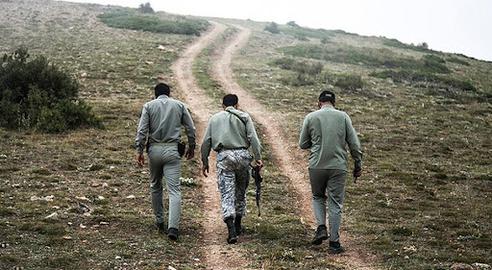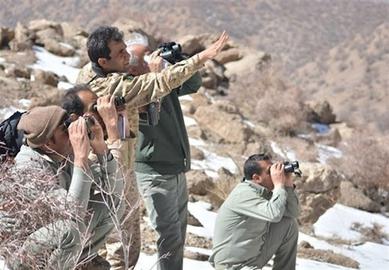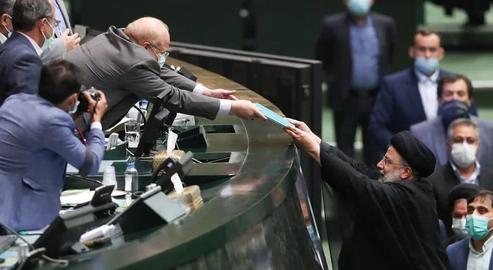Iran’s Supreme Court has upheld a verdict against a warden working for the Department for the Environment who shot a man found illegally hunting in a protected area, and whose injuries eventually resulted in his death.
On August 4, 2020, environmental protection agent Boroumand Najafi and four of his colleagues fired shots at an off-road vehicle used by a group of men illegally hunting in the Bistoon Protected Area in Kermanshah province. A bullet fired by Najafi hit one of the men, who later died from his injuries.
The head of Iran’s Environmental Protection Agency Jamshid Mohabatkhani expressed hope that, through the "efforts of the head of the Department of the Environmental and the support of the head of the judiciary," the sentence against Najafi would be reviewed and lifted.
But it’s not the first time that an employee for the unit has been sentenced to death.
IranWire spoke with Hossein Raisi, a lawyer and professor at Carleton University in Canada, Mohsen Arsalan, an environmental activist in Germany, and Iman Memarian, a wildlife veterinarian living in Namibia, about the details of the case and the heavy sentence handed down to Boroumand Najafi.
***
Why Was Boroumand Najafi Sentenced to Death?
According to Hamshahri Online, in August 2020, Boroumand Najafi and four other Department of the Environment employees were involved in a clash with armed men thought to be hunting wildlife in the Bistoon protected area in Kermanshah province.
A member of the public contacted the Kermanshah Environmental Protection Unit and informed them that four poachers had illegally entered the Bistoon protected area and were hunting wildlife there. Shortly thereafter, the informant said, five environment wardens were deployed to the area. Near the village of Sehchek in Bistoo, the officers identified a Pride car resembling the vehicle the informant had described when reporting the incident. A fight broke out between the wardens and the hunters, and shots were fired. Most of the shots hit the car, but in the chaos, a bullet, thought to have been shot by Boroumand Najafi, hit one of the men. He later died from his injuries. Although the person did not specify what sort of animal the men had been hunting, poachers in Iran regularly shoot goats, deer and birds, and in some cases, more exotic animals such as leopards.
The Hamshahri Online report stated the men fled in the car, and the officers were unable to present evidence that the men had been armed. In court, Najafi’s four colleagues corroborated his claim that the men had "carried their hunting weapons and backpacks and entered the Bistoon Protected Area.” Despite this, the Court of First Instance did not acknowledge the statements as substantial enough to find Najafi innocent, and the Supreme Court has now upheld that decision.
Death Penalties Against Wildlife Wardens
Mohsen Arsalan, an environmental and wildlife activist based in Nuremberg, Germany, told IranWire that Boroumand Najafi was not the first individual working for the Department of the Environment to be sentenced to death for carrying out his duty and for likely acting in self-defense. He also said he did not think he would be the last.
Arsalan highlighted the cases of Asad Taghizadeh, a ranger covering the Dena Protected Area in Kohgiluyeh and Boyer-Ahmad Province, and Saeed Momivand, who worked in the Nashr Protected Area. Both were sentenced to death for shooting poachers who later died from their injuries, as reported by the media in recent years.
“Environmental officers are allowed to carry weapons, but they are only allowed to use them in very specific circumstances," Arsalan told IranWire. "There are gaps in the rules guiding their use of weapons, which from time to time lead to these outcomes. The same rules do not apply to police officers and anti-narcotics forces. Environment agents can only use weapons if their lives or the lives of their colleagues are endangered by perpetrators."
What Does the Law Say?
IranWire spoke to Hossein Raisi, a lawyer with 20 years’ experience working in Iran. Raisi, who is now based in Toronto, is also a human rights activist and opposes the death penalty.
He said it was his understanding that Department of the Environment wardens were entitled to carry arms but only use them in exceptional circumstances. He confirmed, too, that courts had handed down death penalties against them in the past. He said rangers are officially employed by the judiciary, and so have the right to carry and use weapons to carry out their duties. Like other armed forces, the law on the use of weapons applies to them, and yet these wardens do not benefit from the support other armed forces enjoy.
”There are rules for the use of firearms by all judicial officers, which includes using them for issuing warnings, aerial firing, and rules about lower-body firing," he said. "According to the law, the nature of the job of environmental rangers means they have to deal with people who encroach on the privacy of protected areas and wildlife. Therefore, according to the conditions stated in these instructions, they are allowed to deal with violators.”
This, Raisi said, was logical, and added: “But what is surprising is the way the judiciary treats these issues: as premeditated murder."
How Can Rangers be Sentenced to Death if They are Operating Within the Law?
Raisi attributes the judiciary's approach in these extreme cases to two structural flaws in the legal system of the Islamic Republic. "The first is that, unlike other units of the armed forces, where the government pays the victim's ‘blood money’ from the public budget, the criminal responsibility rests solely with environment agency officials, and the Department of the Environment escapes any responsibility," he told IranWire.
"The second structural defect is that, within the legal structure of the Islamic Republic, the definition of premeditated murder is incorrect. Under its laws, if a person inflicts damage to another person by any means and it leads to their death, even if the person in question did not intend to kill, the murder is regarded as intentional according to Article 290 of the Islamic Penal Code. This definition is incorrect."
"Under this definition, a person who has killed another person out of wickedness is seen as the same as someone who, for example, is an environmental protection officer and who kills, by mistake, an individual who is not following the rules," Raisi said. “For this reason we must change the traditional definition of premeditated murder, which is rooted in Islamic jurisprudence, and save those who have unintentionally killed another person from the risk of execution."
Raisi also said punishments fell short in some cases. "Under the Islamic Penal Code, if a case appears to be premeditated murder, the punishment is somewhat insignificant, and does not compensate for the damage done to the victim and his family. Therefore, the structure must be modified. If the definition of premeditated murder is changed and cases like this, as in many countries in the world, are changed from premeditated murder to second-degree murder — which is both a relatively severe punishment and does not result in lead execution — justice will be done.
"Execution dates back to the time of Hammurabi, who lived around 18 BC, but we still carry out this punishment because Islam endorses it,” he added.
Zabihollah Khodaian, a spokesperson for the judiciary, told a press conference on November 16, 2021: “We spoke to the Chief Justice of the province, and were informed that Boroumand Najafi was sentenced because the rules had not been observed, because the murder took place in a residential, unprotected environment, the individuals shot by officers were unarmed and the officers themselves did not sustain attacks against them. Therefore, the court has sentenced the environment officer.”
But Raisi highlighted the irrelevance of the “urban environment” claim. "Again, it cannot be considered as grounds to register it as premeditated murder,” he said, while also questioning the veracity of the other claims.
Are Poachers Not Worried About Clashes with Rangers?
Iman Memarian, a veterinarian and wildlife activist, also said the verdict is unjust and incorrect because it ignores the specific conditions in which weapons were used by the officers. "Illegal poachers make huge profits and are therefore willing to pursue their interests in any way possible," he told IranWire. "In Namibia, for example, where I live, rhino hunting is punishable by death. Nevertheless, the financial benefits of selling rhino horn are so great that the hunter runs the risk of being executed.
"In the case of Iran, although the benefits and penalties of poaching are not as great as in Africa, in the current economic climate, it is such a large financial incentive that poachers are willing to harm environmental officials," he said. "We have seen many cases of poachers and other people who destroy the environment for financial gain killing officers."
He said poachers have been known to attack on-duty rangers, but there have also been incidents when officers have been attacked while not on duty, including one being assauted while in a line at a a bakery. There have even been grenade attacks on the families of officers. According to reports in the media, some of these incidents, such as a case in Zanjan when illegal hunters attacked two environment officers with weapons, resulted in the deaths of the officers.
German environmental activist Mohsen Arsalan says the punishment for illegal hunters makes it clear that the government and authorities do not value the work done by environment protection agents, and they don’t even value the environment itself highly enough. "The judge told the agent: 'I know you got into a fight with a hunter because of a goat,'" Arsalan told IranWire, citing a conversation he had with rangers who had been prosecuted for dealings they had with poachers and people who had caused damage to the environment. “It's clear the system leaves the hunter free to destroy wildlife. Iranian wildlife, many aspects of which are in danger of extinction, is the ultimate victim.”
Arsalan also said those tasked with protecting the environment were not given the support they needed to deal with the hostilities they encounter.
"Iranian environment agents have very basic equipment. Agents at some checkpoints do not even have a suitable car, even though they are monitoring several hundred hectares,” he said. “Officers are forced to carry out patrols on foot or on motorbikes.” he said. "They also lack equipment to track predators, meaning they are always one step behind.”
He added that such a situation means more people will sustain injuries or even die, and damage to the environment will continue.
"Legislators and law enforcement in Iran do not know the value of the environment and wildlife, and that is why they leave environmental protection agents defenseless and unsupported on hundreds of hectares of land, without equipment, to deal with those who come to destroy the environment and wildlife."
Related coverage:
Calls for Environmental Activists to be Released as COP26 Begins in Glasgow
IranWire Exclusive: Environmental Activists Tortured and Forced to Confess
1200 Hours of Torture, Sexual Threats and Forced Confessions
visit the accountability section
In this section of Iran Wire, you can contact the officials and launch your campaign for various problems























comments